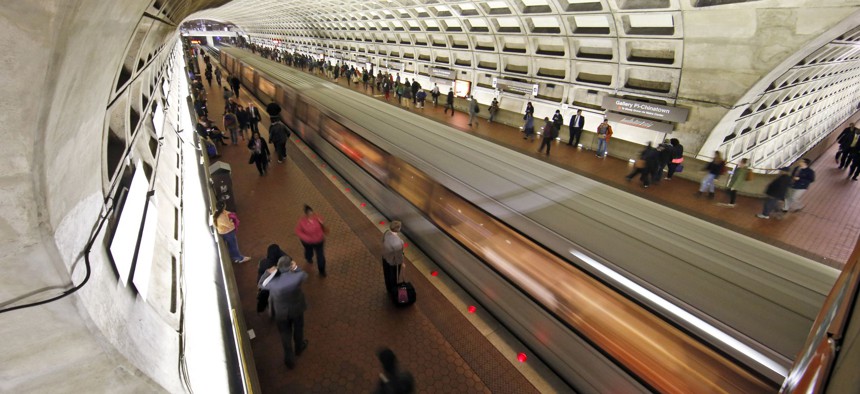Connecting state and local government leaders
New rail lines spark excitement out west, but some aging systems back east are in big trouble.
WASHINGTON — Amid a steady drumbeat of news headlines about many of the serious infrastructure challenges that face older public transit networks, including the ailing Metrorail system in the nation’s capital, this weekend offered up some more welcome news from Colorado.
Officials gathered in Denver to initiate commuter rail service along the Regional Transportation District’s long-awaited new A Line, connecting Denver International Airport with downtown. The public lined up for free rides along the 23-mile rail corridor, which is going to change the way people travel between the city and its heavily trafficked airport, as I previewed in March.
But just as commuters in Denver—along with those in Seattle and Los Angeles, which have already opened up new light rail system extensions in 2016 with more coming later this year—can feel upbeat about their new infrastructure investments coming online after years of construction and planning, there’s ongoing sobering transit news back east.
In New York City, subway riders in Manhattan and Brooklyn are staring down an unavoidable and lengthy shutdown of the L train’s Canarsie tubes under the East River, which endured major saltwater corrosion and sustained other damage from Hurricane Sandy’s floodwaters. The reconstruction work—and the major disruption it will bring along 14th Street in Manhattan and in Brooklyn neighborhoods like Williamsburg and Bushwick—is slated to start in 2019. The Metropolitan Transportation Authority is preparing for public meetings to detail the reconstruction work involved and the impacts it will have for commuters.
On Monday, D.C.-area commuters will be digesting The Washington Post’s latest deep dive into the multi-faceted woes facing the Washington Metropolitan Area Transit Authority and its troubled Metrorail system.
In its in-depth piece, the Post recounted more than a generation’s worth of problems that led to Metrorail’s finances and operations to spiral out of control, everything from a poor maintenance track record, lack of sustainable funding stream, decreasing reliability and ridership, troubled finances, lax safety culture and deadly incidents, including the 2009 Red Line crash. Many of the system’s problems that manifested over the years were actually predicted in the 1970s when the system first opened, according to the Post.
And they only got worse over time, even if the public didn’t notice at first. But there were plenty of telltale signs along the way.
Richard White, when he was WMATA’s general manager, warned in 2004 of a looming “death spiral” for the agency because of its mounting maintenance issues and fiscal problems.
The Post’s article also hits on a significant problem when it comes to infrastructure everywhere: It’s far easier to open up something that’s shiny and new. But it’s far more difficult to get excited about maintaining what you already have.
According to the Post:
When White used the phrase “death spiral” to call attention to Metro’s need to start rebuilding parts of the existing system, he said he got “pushback” from Metro board members and the elected officials who appointed them.
Instead, they kept pushing for Metro to grow. The politicians who held the purse strings seemed happy to invest in laying new tracks and opening new stations, where they could tout development at opening ceremonies. But they cared less about spending for maintenance to prevent breakdowns years later, when they might no longer be in office.
Said White: “People couldn’t get enough of this extension stuff, and didn’t want to listen to anything about taking the medicine, and taking care of what needed to be taken care of.”
While Metrorail’s woes in the Washington, D.C., area shouldn’t necessarily deter other cities with their transit-expansion ambitions—voters in the Seattle area and Los Angeles County will consider major transportation expansion funding packages this fall—they serve as a good reminder about how civic leaders must plan to maintain those systems for the long haul.
When you’re dealing with infrastructure investments that cost billions of dollars to plan and construct, leaders—and the public at large—really have no choice in the matter.
It’s easy to attend a ribbon-cutting ceremony for a new rail line. But it’s also too easy to forget about what’s coming decades down the line when it comes to necessary maintenance.
The smartest agencies and most well-run governments are the ones that can successfully plan for those inevitable infrastructure challenges. And those infrastructure challenges are immense.
Michael Grass is Executive Editor of Government Executive’s Route Fifty. He’s written about transit in Washington, D.C., for DCist, Washington City Paper, The Washington Post's Express and The Huffington Post. In a previous professional life, he worked as a consultant on a post-9/11 Federal Transit Administration emergency preparedness program.

NEXT STORY: Broadband’s ‘Tempting Voices’ Viewed With Suspicion in Virginia; Chicago Alderman Punched in Face




